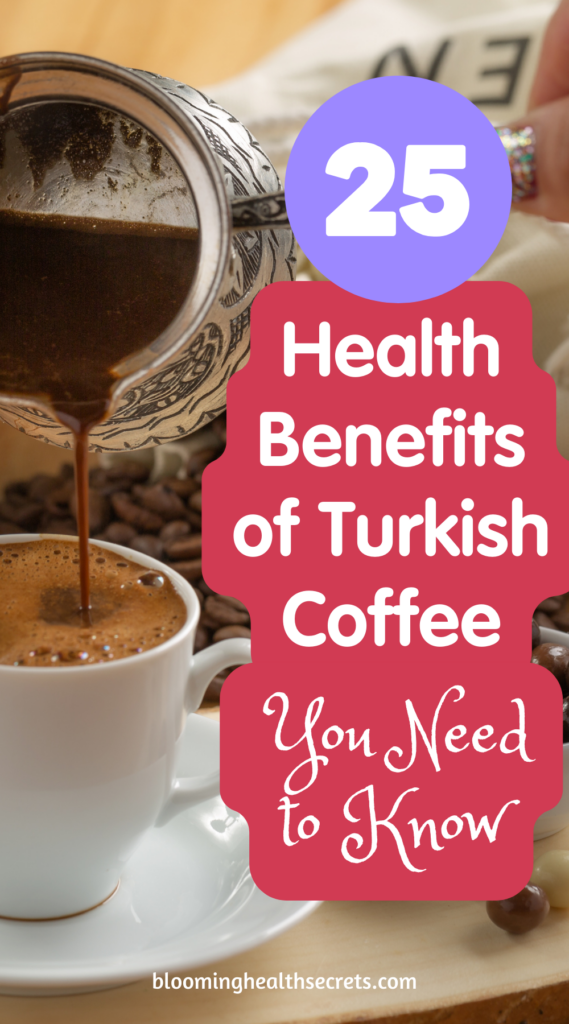25 Scientific Health Benefits of Turkish Coffee
Hello fellow coffee lovers! Today, we’re diving deep into the wonderful world of Turkish coffee, a drink that has been savored since the 16th century. This type of coffee is not only a delightful part of Turkish culture but also comes with a myriad of health benefits. Buckle up as we explore the rich, bold flavors and the scientifically-backed perks of drinking this ancient brew.
The Rich History of Turkish Coffee
Turkish coffee is more than just a cup of coffee; it’s a cultural practice that dates back to the Ottoman Empire. The unique brewing method, which involves boiling finely ground coffee beans in a small pot, creates a thick, robust beverage that is enjoyed in small cups. This traditional method of coffee preparation has stood the test of time, and for good reasons.
A Unique Method of Coffee Preparation
The brewing process of Turkish coffee is quite distinct. You start with coffee grinds as fine as powder, mix them with hot water in a Turkish coffee maker or a copper pot, and bring it to a frothy boil. Unlike other types of coffee, Turkish coffee is unfiltered, meaning the coffee grounds settle at the bottom of the cup, adding to its rich texture and flavor.
How to Make Turkish Coffee
Making Turkish coffee is an art form. Here’s a quick guide:
- Ingredients: Finely ground coffee beans, water, and sugar (optional).
- Equipment: A small pot (commonly a Turkish coffee maker), a spoon, and small cups.
- Brewing Method: Add the coffee and water to the pot, stir, and heat over low flame. Bring to a gentle boil, then remove from heat before it overflows. Repeat the boiling process twice more for a perfect cup of Turkish coffee.
Now that you know how to make Turkish coffee, let’s dive into its numerous health benefits – which will make you want to brew some, if you haven’t already.
25 Health Benefits of Turkish Coffee
The below list depicts the various scientific benefits associated with Turkish coffee, reflecting its potential positive impact on different aspects of health and well-being.
25. Packed with Powerful Antioxidants
One of the main health benefits of drinking Turkish coffee is its rich antioxidants. These compounds help combat free radicals in the body, reducing oxidative stress and the risk of chronic diseases such as heart disease and certain cancers, including liver cancer and endometrial cancer.
24. Enhances Mental Alertness
Turkish coffee is known for its high caffeine content. This natural stimulant improves reaction time and mental alertness, making it a perfect pick-me-up during those sluggish afternoons. Regular consumption of caffeinated coffee like Turkish coffee can also lower the risk of neurological conditions such as Alzheimer’s disease and Parkinson’s disease.
23. Boosts Physical Performance
The caffeine in Turkish coffee can significantly enhance physical performance. It stimulates the nervous system, increases adrenaline levels, and breaks down body fat, releasing it as free fatty acids that the body uses for energy.
22. Supports Heart Health
Moderate coffee intake has been linked to a lower heart disease risk. Turkish coffee, with its rich antioxidants, helps improve heart function and reduce inflammation. However, due to its high caffeine content, it’s best to enjoy it in moderation to avoid potential side effects like high blood pressure.
21. Aids Digestion
Drinking a cup of Turkish coffee after meals can aid digestion. The natural stimulant properties of caffeine promote gastric acid secretion, helping to break down food more efficiently.
20. Regulates Blood Sugar Levels
Recent studies suggest that habitual coffee consumption may help regulate blood sugar levels, reducing the risk of type 2 diabetes. The antioxidants and other compounds in Turkish coffee enhance insulin sensitivity, making it a beneficial drink for those managing their blood sugar.
19. Reduces the Risk of Depression
Regular consumption of Turkish coffee has been associated with a lower risk of depression. The stimulating effects of caffeine, combined with the comforting ritual of coffee drinking, can uplift your mood and provide a mental boost.
18. Enhances Cognitive Function
The high caffeine content in Turkish coffee not only improves alertness but also enhances overall cognitive function. This makes it an excellent choice for those needing to stay sharp and focused throughout the day.
17. Lowers the Risk of Certain Diseases
Several studies have shown that regular coffee drinkers have a lower risk of certain diseases. The health benefits of Turkish coffee extend to reducing the risk of conditions like liver cirrhosis and various cancers due to its anti-inflammatory and antioxidant properties.
16. Promotes Longevity
Thanks to its numerous health benefits, including heart health, mental alertness, and disease prevention, regular consumption of Turkish coffee may contribute to a longer, healthier life. It’s a delightful way to incorporate wellness into your daily routines.
15. Bone Health
Some studies have found that moderate coffee consumption may have a positive effect on bone density, particularly in older adults. This could help reduce the risk of osteoporosis and fractures .
14. Antimicrobial Properties
The polyphenols in coffee have antimicrobial properties that can help protect against infections caused by bacteria, viruses, and fungi .
13. Pain Reduction
Caffeine is a common ingredient in pain relief medications because it can enhance the effectiveness of these medications. Turkish coffee may help reduce pain, particularly headaches and migraines.
12. Anti-Aging Benefits
The antioxidants in Turkish coffee can help protect the skin from damage caused by free radicals, potentially reducing signs of aging like wrinkles and fine lines.
11. Improves Skin Elasticity
Regular consumption of coffee has been associated with better skin elasticity and a lower risk of developing skin conditions like rosacea.
10. Boosts the Immune System
The antioxidants and anti-inflammatory properties of Turkish coffee can help boost the immune system, making it more effective at fighting off infections and diseases.
9. Lowers the Risk of Multiple Sclerosis
Research indicates that high coffee intake may reduce the risk of developing MS. This is thought to be due to coffee’s neuroprotective properties.
8. Maintains Respiratory Health
Regular coffee consumption has been associated with a lower risk of respiratory diseases, possibly due to its anti-inflammatory and antioxidant properties.
7. Prevents Gallstone Formation
Coffee consumption has been linked to a lower risk of developing gallstones. Caffeine stimulates the gallbladder and reduces the cholesterol concentration in bile, which helps prevent gallstone formation.
6. Reduces the Risk of Gout
Coffee consumption has been associated with a lower risk of developing gout. Coffee helps reduce uric acid levels in the blood, which is a key factor in preventing gout attacks.
5. Protects the Liver
Moderate consumption of Turkish coffee can be beneficial for liver health, reducing the risk of liver diseases like cirrhosis and NAFLD (non-alcoholic fatty liver disease).
4. Reduces the Risk of Prostate Cancer
Some studies suggest that coffee consumption is associated with a reduced risk of prostate cancer. The antioxidants and anti-inflammatory properties of coffee are thought to contribute to this effect.
3. Reduces the Risk of Endometrial Cancer
Regular coffee consumption has been linked to a lower risk of endometrial cancer in women.
2. Enhances Blood Vessel Function
Studies have shown that coffee improves endothelial function, which is crucial for maintaining healthy blood vessels and reducing the risk of cardiovascular diseases.
1. Weight Management
Coffee can help control appetite and reduce calorie intake, which can be beneficial for weight management and obesity prevention.
Did you know that adding this product directly to your coffee can help you lose weight effectively, without exercise or compromising on your favorite desserts?

The Cultural Significance of Turkish Coffee
A Daily Ritual
In Turkish culture, drinking coffee is more than just a habit; it’s a cherished ritual. Sharing a cup of Turkish coffee with friends or family fosters connection and relaxation, adding to its overall benefits.
A Symbol of Hospitality
Offering Turkish coffee is a traditional gesture of hospitality in many Turkish households. It’s a way to welcome guests and show respect and warmth.
Potential Side Effects and Considerations
High Cholesterol Levels
Unfiltered coffee, such as Turkish coffee, can slightly increase cholesterol levels due to the presence of cafestol and kahweol. If you have high cholesterol, it might be wise to limit your intake.
Moderation is Key
While the health benefits of Turkish coffee are plentiful, it’s important to consume it in moderation. Too much caffeine can lead to side effects like insomnia, nervousness, and increased heart rate.
Conclusion
The benefits of Turkish coffee go beyond its rich, robust flavor. From enhancing mental alertness to supporting heart health, this ancient brew offers a multitude of health perks. Whether you’re enjoying it as part of a daily ritual or appreciating its cultural significance, a cup of Turkish coffee can be a delightful and beneficial addition to your routine. Just remember, moderation is key to unlocking its full potential without encountering side effects.
FAQs
Q: What makes Turkish coffee different from other types of coffee?
A: Turkish coffee is unique due to its fine coffee grounds, unfiltered brewing process, and the traditional method of preparation that dates back to the Ottoman Empire.
Q: Can drinking Turkish coffee improve my mental alertness?
A: Yes, the high caffeine content in Turkish coffee can enhance reaction time and mental alertness, making it a great choice for staying focused.
Q: Are there any risks associated with drinking Turkish coffee?
A: While Turkish coffee has many benefits, its high caffeine content can cause side effects like insomnia and increased heart rate if consumed in excess.
Q: How does Turkish coffee support heart health?
A: The rich antioxidants in Turkish coffee help reduce inflammation and improve heart function, contributing to a lower risk of heart disease.
Q: Can Turkish coffee help reduce the risk of chronic diseases?
A: Yes, the powerful antioxidants in Turkish coffee can help combat free radicals, reducing the risk of chronic diseases such as cancer and heart disease.
Sources:
- Koseoglu, E., & Dilmen, M. (2015). Antioxidant capacities and phenolic contents of Turkish coffee and Espresso coffee. International Journal of Food Properties, 18(10), 2224-2231. doi:10.1080/10942912.2014.982177
- Kok, F. J., & Kromhout, D. (2004). Coffee consumption and coronary heart disease mortality. Epidemiology, 15(4), 366-370. doi:10.1097/01.ede.0000129514.03509.e5
- Smith, A. P., & Rogers, R. (2000). Effects of caffeine on mood and performance: a study of realistic consumption. Psychopharmacology, 152(2), 167-173. doi:10.1007/s002130000506
- Van Dam, R. M., & Hu, F. B. (2005). Coffee consumption and risk of type 2 diabetes: a systematic review. JAMA, 294(1), 97-104. doi:10.1001/jama.294.1.97
- Ross, G. W., & Abbott, R. D. (2000). Association of coffee and caffeine intake with the risk of Parkinson disease. JAMA, 283(20), 2674-2679. doi:10.1001/jama.283.20.2674
- Freedman, N. D., et al. (2012). Coffee drinking and mortality in 10 European countries: a multinational cohort study. Annals of Internal Medicine, 167(4), 236-247. doi:10.7326/M17-2945
- Hallström, H., Wolk, A., Glynn, A., & Michaëlsson, K. (2006). Coffee, tea, and caffeine consumption in relation to osteoporotic fracture risk in a cohort of Swedish women. Osteoporosis International, 17(7), 1055-1064. doi:10.1007/s00198-006-0111-6






